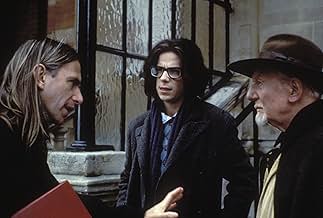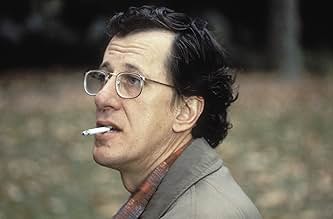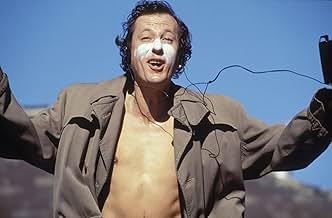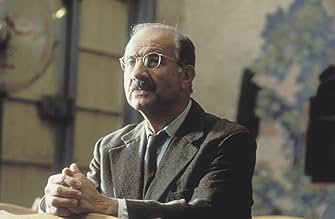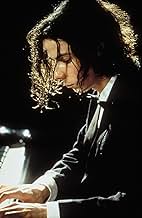IMDb रेटिंग
7.6/10
57 हज़ार
आपकी रेटिंग
अपने पिता और शिक्षकों द्वारा संचालित पियानोवादक डेविड हेल्फगोट, मानसिक तौर पर टूट जाता है। सालों बाद वह पियानो पर लौटता है, अगर महत्वपूर्ण प्रशंसा नहीं तो लोकप्रिय होने के लिए।अपने पिता और शिक्षकों द्वारा संचालित पियानोवादक डेविड हेल्फगोट, मानसिक तौर पर टूट जाता है। सालों बाद वह पियानो पर लौटता है, अगर महत्वपूर्ण प्रशंसा नहीं तो लोकप्रिय होने के लिए।अपने पिता और शिक्षकों द्वारा संचालित पियानोवादक डेविड हेल्फगोट, मानसिक तौर पर टूट जाता है। सालों बाद वह पियानो पर लौटता है, अगर महत्वपूर्ण प्रशंसा नहीं तो लोकप्रिय होने के लिए।
- 1 ऑस्कर जीते
- 46 जीत और कुल 52 नामांकन
कहानी
क्या आपको पता है
- ट्रिवियाGeoffrey Rush had once learned the piano up until aged fourteen. He took up piano lessons again thirty years later for this movie and also acted as his own hand double and body double.
- गूफ़The character shows all signs of schizophrenia; not bipolar disorder (formerly known as "manic-depressive disorder"), as is claimed in the film. The real David Helfgott likewise displays many symptoms of schizophrenia and none of bipolar disorder.
- भाव
Cecil Parkes: You must play as if there's no tomorrow.
- क्रेज़ी क्रेडिटHimself: hand double for Geoffrey Rush
- साउंडट्रैकWith A Girl Like You
Written by Reg Presley
© 1966 Dick James Music Limited
Performed by The Troggs
© 1966 Mercury Ltd. London
फीचर्ड रिव्यू
Okay, so I did some reading after this driven by idle curiosity about the account. The real Helfgott didn't spend 15 years abandoned in a room with a piano, he didn't have to stand in the rain outside of a bar before they would let him in. He was pretty well known in the local scene as a pianist, his father was not a Holocaust survivor and David had been married before. Father and son were never really estranged and David was present at his funeral.
But just the same, the 'objective' point-of-view that purports to explain him, or any of us at any time based on a few facts, is in the end no less hypocritical than any attempt to pass dramatization as 'the real story'. This matters. Someone can be present at a funeral without being truly present, and someone can feel forgotten and alone even when they're factually surrounded by people, estranged from a parent even when formally this was never so.
The film is at a simple emotional level where the attempt to conquer a maddening complexity (music, life) snaps the tethers of mind and in due time the reconfiguring of this damage into blossoming art. The moral is that we must keep trying and hope for the best, perhaps the worthiest lesson even if it appears slightly trite in the context of a more or less happy ending.
Still, why feel the need to invent all those things, knowing you are doing so? When the violence inflicted on the son could be inferred by a more ambiguous tension instead of an outright beating.
Because, it seems, we can only choose to accept the lesson if at the center we find a good soul worthy of the saving. In other words, it is not the fact that he gives a great last recital that matters, but that he plays at all; not that a genius was salvaged because he might never have been that, but a human being. And this is what rankles so much Helfgott's critics who find him borderline incompetent in his playing - he is cheered on in concerts because he is the character from this film.
Ideally we would be able to discern all these points here instead of one harmony: the truly damaged but kind soul, the inability to place blame for that damage on any ogre father or Holocaust, and being able to somehow experience his music (the real Helfgott recorded for the film) as a trained ear would, fixated flourishes followed by distraction and incompetence according to critics, musically extending the damaged self.
For a more demanding film on the same subject of madness and transcendent musical genius see a little known film on a medieval composer called Death in Five Voices: all about the dissonance between different voices trying to harmonize a story and this carried in the music itself.
But just the same, the 'objective' point-of-view that purports to explain him, or any of us at any time based on a few facts, is in the end no less hypocritical than any attempt to pass dramatization as 'the real story'. This matters. Someone can be present at a funeral without being truly present, and someone can feel forgotten and alone even when they're factually surrounded by people, estranged from a parent even when formally this was never so.
The film is at a simple emotional level where the attempt to conquer a maddening complexity (music, life) snaps the tethers of mind and in due time the reconfiguring of this damage into blossoming art. The moral is that we must keep trying and hope for the best, perhaps the worthiest lesson even if it appears slightly trite in the context of a more or less happy ending.
Still, why feel the need to invent all those things, knowing you are doing so? When the violence inflicted on the son could be inferred by a more ambiguous tension instead of an outright beating.
Because, it seems, we can only choose to accept the lesson if at the center we find a good soul worthy of the saving. In other words, it is not the fact that he gives a great last recital that matters, but that he plays at all; not that a genius was salvaged because he might never have been that, but a human being. And this is what rankles so much Helfgott's critics who find him borderline incompetent in his playing - he is cheered on in concerts because he is the character from this film.
Ideally we would be able to discern all these points here instead of one harmony: the truly damaged but kind soul, the inability to place blame for that damage on any ogre father or Holocaust, and being able to somehow experience his music (the real Helfgott recorded for the film) as a trained ear would, fixated flourishes followed by distraction and incompetence according to critics, musically extending the damaged self.
For a more demanding film on the same subject of madness and transcendent musical genius see a little known film on a medieval composer called Death in Five Voices: all about the dissonance between different voices trying to harmonize a story and this carried in the music itself.
- chaos-rampant
- 31 दिस॰ 2013
- परमालिंक
टॉप पसंद
रेटिंग देने के लिए साइन-इन करें और वैयक्तिकृत सुझावों के लिए वॉचलिस्ट करें
- How long is Shine?Alexa द्वारा संचालित
विवरण
- रिलीज़ की तारीख़
- कंट्री ऑफ़ ओरिजिन
- आधिकारिक साइटें
- भाषाएं
- इस रूप में भी जाना जाता है
- Tỏa Sáng
- फ़िल्माने की जगहें
- उत्पादन कंपनियां
- IMDbPro पर और कंपनी क्रेडिट देखें
बॉक्स ऑफ़िस
- बजट
- $55,00,000(अनुमानित)
- US और कनाडा में सकल
- $3,58,92,330
- US और कनाडा में पहले सप्ताह में कुल कमाई
- $1,62,179
- 24 नव॰ 1996
- दुनिया भर में सकल
- $3,59,99,121
- चलने की अवधि1 घंटा 45 मिनट
- रंग
- ध्वनि मिश्रण
- पक्ष अनुपात
- 1.85 : 1
इस पेज में योगदान दें
किसी बदलाव का सुझाव दें या अनुपलब्ध कॉन्टेंट जोड़ें





